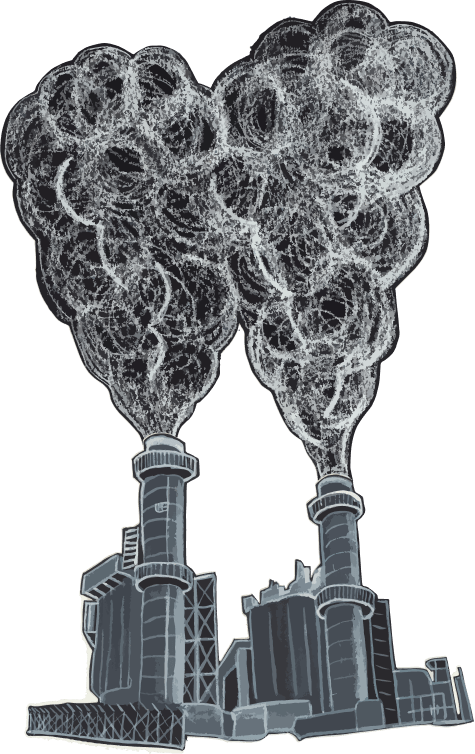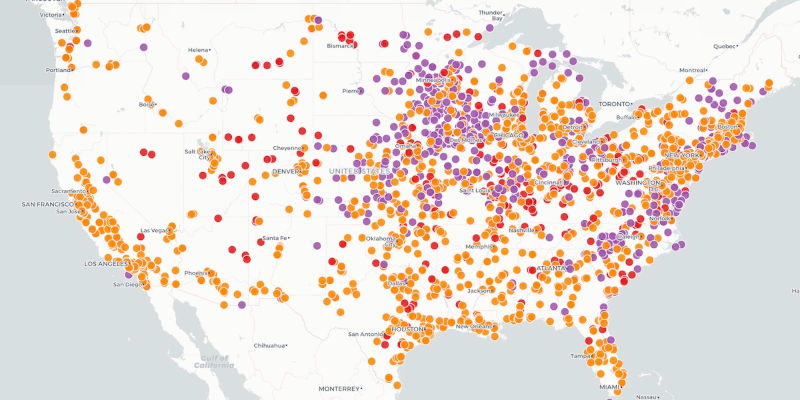Indiana
Back to mapTo get to zero by 2050, Indiana must cut emissions by 3.7% a year
Emissions in Indiana
Million metric tons of carbon dioxide (CO2) equivalent (MTCO2e
) emissions
Note: Grey area indicates missing data due to processing delays.
Source: WRI, Mar 2021
This is how we're going to do it
- Boilers and furnaces with heat pumps
- Gas stoves with electric induction stoves
- No-till farming to keep CO2 in the soil
- Capturing methane leaks from landfills
- Capturing CO2 to make emissions-free concrete
- Burning green hydrogen to make emissions-free steel
- Plugging methane leaks from gas pipelines
Decarbonize Our Buildings
6% of Indiana's climate pollution comes from buildings.
We burn fossil fuels to heat our air, water, and food.
To cut this pollution...
Let's electrify our heat!
We'll replace...
...in all of Indiana's 3.4 million buildings.
In fact, 31.5% of appliances in buildings in Indiana are already fossil fuel free!
That means we only need to electrify the remaining 2.3 million dirty buildings in Indiana. That's around 86,000 per year.
Source: Microsoft, Mar 2021; NREL, Dec 2021Electrifying all buildings cuts 6% of the pollution.
Decarbonize Our Transport
18% of Indiana's pollution comes from cars, trucks, trains, and planes.
But mostly from cars.
To cut this pollution,
your next car must be electric.
Or consider going car-free with public transit, bikes/e-bikes, car share, or other alternatives!
There are 2.1 million vehicles in Indiana and 7,000 are already electric (0.3% of the total).
We need to electrify (or replace) the remaining 2.1 million gas-powered vehicles. That's around 78,000 a year.
Source: DOT, Feb 2021Electrifying all transportation cuts 18% of the pollution.
Decarbonize Our Power
37% of Indiana's pollution comes from burning coal, gas, and oil to make power.

To cut this pollution...
Put solar panels on your roof!
Then, we'll replace all fossil fuel power plants with solar and wind farms.

...and find good jobs for those workers.
Current Fossil Fuel Power Plants in Indiana
14 coal plants
Gibson
Gibson County
3,340 MW
Rockport
Spencer County
2,600 MW
R M Schahfer Generating Station
Jasper County
2,201 MW
IPL - Petersburg Generating Station
Pike County
2,155 MW
Clifty Creek
Jefferson County
1,304 MW
Cayuga
Vermillion County
1,185 MW
Merom
Sullivan County
1,080 MW
Edwardsport Generating Station
Knox County
949 MW
Alcoa Allowance Management Inc
Warrick County
823 MW
A B Brown Generating Station
Posey County
707 MW
Michigan City Generating Station
LaPorte County
680 MW
R Gallagher
Floyd County
600 MW
F B Culley Generating Station
Warrick County
415 MW
Whitewater Valley
Wayne County
94 MW
29 gas plants
St. Joseph Energy Center LLC
St Joseph County
2,186 MW
Lawrenceburg Energy Facility
Dearborn County
1,232 MW
IPL - Harding Street Station (EW Stout)
Marion County
1,178 MW
Sugar Creek Generating Station
Vigo County
1,128 MW
2 oil plants
Hendricks Regional Health
Hendricks County
4 MW
Hurricane Creek Lift Station
Johnson County
2 MW
But wait!
It's not enough to replace our power plants with wind and solar farms.
To power our electric cars and buildings, we need two times the electricity we have today.
In all, we'll need to build 9,000 megawatt (MW) of wind power and 10,000 MW of solar power.
Since the average wind turbine provides 2.75 MW of peak capacity, Indiana would need to install about 3,000 turbines.
Since Indiana already has 902 MW of wind and 101 MW of solar, that's 8,000 MW of wind power we need to build and 10,000 MW of solar power. That's around 312 MW of wind power and 364 MW of solar power a year.
Source: EIA, Apr 2022Decarbonizing all dirty power cuts 37% of the pollution.
And gives us zero-emissions power we need to eliminate pollution from buildings and cars!
Other Emissions
The last 38% of Indiana's climate pollution comes from other sources...
This includes farming, landfills, industry, and leaks from gas pipelines.
There's no one solution to solve these problems, but there are lots of great ideas:
That doesn't mean there's no solution, it just means that clean electrification doesn't help with these problems, and you could fill a whole book with covering all of them. We need to encourage our politicians to invest in researching new solutions and implementing existing solutions to these problems!
Ready to do your part?
Learn how to electrify your own machines and pass local policy to electrify the rest
Take Action